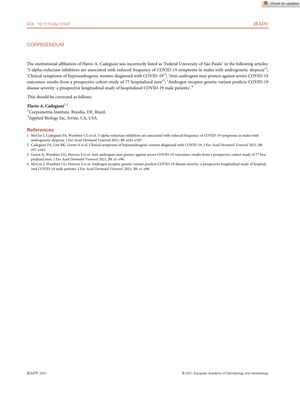Corrigendum
April 2021
in “
Journal of the European Academy of Dermatology and Venereology
”

TLDR The document corrects an author's affiliation in previous articles about COVID-19 and its links to hair loss and hormones.
This document is a corrigendum to correct the institutional affiliation of Flavio A. Cadegiani, which was previously listed incorrectly as 'Federal University of São Paulo' in four articles related to COVID-19 and its association with androgenetic alopecia, hyperandrogenism, and the use of anti-androgens. The correct affiliations should be 'Corpometria Institute, Brasilia, DF, Brazil' and 'Applied Biology Inc, Irvine, CA, USA'. The articles in question discussed the reduced frequency of COVID-19 symptoms in males with androgenetic alopecia taking 5-alpha-reductase inhibitors, the clinical symptoms of hyperandrogenic women diagnosed with COVID-19, the potential protective effects of anti-androgens against severe COVID-19 outcomes, and how an androgen receptor genetic variant may predict COVID-19 disease severity.



